#there are horses in this movie
Photo
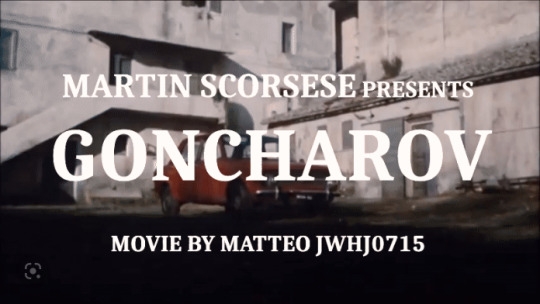
Goncharov
Why the hell is an MST3K blog rising from the dead to review a forgotten Martin Scorcese film? I'd never heard of this movie until it suddenly became a meme, but I had a day off work and I figured I might as well see what all the fuss was about. Now I want to talk about what I saw, and this is the only movie blog I have, so I'm doing it here.

Ivan Goncharov is the biggest, baddest motherfucker east of the iron curtain, richer than a tsar and colder than a Siberian winter. He's got a beef with Neapolitan mafioso Mario Giglioli, so he heads to sunny Italy to confront him in person. His closest confidante, Andrey, thinks it's suicide to do this on Giglioli's home turf but accompanies Goncharov anyway out of loyalty. What follows is a two-hour dick-measuring contest as Goncharov and Giglioli try to out-intimidate each other, culminating in an orgy of gunfire where only one will be left standing... and this is the kind of movie where you can't take it for granted that it'll be the guy whose name is the title.
That's the ostensible plot, anyway. What makes Goncharov a far more interesting film than such an outline might imply is that the argument between the mobsters is just a backdrop. Having set up Goncharov's hard as steel, cold as ice reputation in the first act, the movie then sets about deconstructing it. Goncharov goes from a terrifying figure devoid of all morality to a tragic antihero, a man who has come to believe his own hype so completely that he can no longer let himself be human.
This is demonstrated mainly by watching the breakdown of his relationships over the course of the tense three days in Naples. The most important person in Goncharov's life is Andrey, the only one he comes near being vulnerable with. Their relationship is depicted as very touchy-feely in a literal sort of way, with Andrey helping Goncharov with his coat and shoes, lighting cigarettes for him, and touching his shoulder or arm as Goncharov confides in him. The framing emphasizes these touches in a very homoerotic way, and I don't think I've got my tumblr goggles on here. These guys have fucked.
As Goncharov becomes more and more obsessed with being tougher and more ruthless than Giglioli, whom he sees as an effeminate softie, Andrey tries to persuade him that the other man is not worth this sort of obsession. Whatever Giglioli did to insult Goncharov (we never find out), Andrey is of the opinion that they should just leave a dead horse in the asshole's bed and move on. Goncharov's pride will not allow him to do that, and the less subtle Andrey is in his attempts to dissuade him, the more Goncharov pushes him away, finally abandoning him entirely. The tragedy of the ending comes from the fact that Andrey refuses to abandon Goncharov in turn.
We also see Goncharov with his wife Katya. He is frequently cruel to her, and she tolerates it because he gives her expensive gifts and because she is seeking a vicarious mending of her relationship with her abusive father - she was never able to earn his love, but perhaps she can earn Goncharov's. This is doomed to failure, as much because of Goncharov as because Katya doesn't actually want it to succeed. Nursing a black eye, Katya pours her heart out to a bartender, Sofia, who tries to help her escape... but this cannot work out, either. As Katya herself says, she doesn't know who she is without her issues.
I am pleased to note, by the way, that every single major character in the movie is named and I can remember them all, which is a bit of a treat for me (I need to watch good movies more often). The only exception is Goncharov himself. The end credits list him as Ivan, but nobody ever calls him that, not even Andrey or Katya. In a flashback scene with his parents, neither calls him by name. This flashback, fascinatingly, is filmed in the first person, looking through Goncharov's own eyes. We are not allowed to see him as a younger, softer man. He refuses to show that side of himself even in the privacy of his memories.
These quieter moments contrast with scenes of ever-escalating brutality, as the Russians and Italians try to force each other to back down by the murder of underlings. The fact that it is literally a contest, and that Goncharov is aware of this and describes it as such, makes the worsening violence ever more meaningless. The death of Giglioli's confessor is particularly awful, and the way Goncharov's goons treat the chapel has to be ten times worse if you're Catholic (fun fact: this scene is apparently removed from the Italian version on Netflix, which must make what Andrey says while waiting for the train into a hell of a non sequitur).
At the climax, the two really can't do anything but kill each other, because it's the only place left to go. Giglioli's priest and mistress are dead. Goncharov's men are almost all dead or out of action, and Goncharov believes Andrey to be dead. The initial insult, whatever it was, is no longer relevant. They have pushed each other to a place where reconciliation is unthinkable. Whoever blinks first loses, but both have already lost so much that victory means nothing. Worse, each recognizes that the other is in the same position, and neither can acknowledge it.
This means Goncharov can also moonlight as an examination of violence in media. Why do movies showcase violence, and why do we watch it? The initial posturing serves a purpose - Goncharov wants Giglioli to know he's here to personally demand an apology, and Giglioli wants Goncharov to know he's outnumbered and should quit while he still can. But once it becomes an exercise in one-up-manship, the 'messages’ vanish and the men are now killing for the sake of killing. Violence in movies can often be gore for gore's sake, pulling out more and more stops in the effort to shock an audience that has been desensitized by years and years of this. That is what Goncharov and Giglioli are doing to each other. Truly distressing moments like the fate of the priest, or what Giuseppe "Icepick Joe" Cozzolino (dressed as a maid!) does to Sofia when he assumes she's Katya because she was in Katya's hotel room, make us wonder why we're watching this - and the mobsters wonder why they're doing it.
In the end, it's all just a blood-soaked version of the sunk cost fallacy. Goncharov had come too far in his vendetta to stop now. Andrey has followed him too far to turn back. Katya has been married to him too long to leave. Of course, any of them could quit at any time and escape from this terrible spiral, but they are unwilling to entertain the possibility. Like Goncharov himself, Andrey and Katya are prisoners of the identities they have built for themselves, and because their identities are so tied to him, they have to go down with him.
One thing I haven't seen a lot of discussion of on tumblr is the way the film uses the contrast in climate. Goncharov in Moscow is in his element. When you see his breath in the wintry air it's as if he's breathing smoke like a dragon. While other people huddle in the cold he stands up straight and tall. In Naples, on the other hand, he is out of place. He wears lighter clothing, but continues to choose long coats and upturned collars, while Giglioli goes around with his shirt unbuttoned. This should serve to emphasize Giglioli's home field advantage and yet, as we see through Goncharov's eyes, they just make Giglioli look soft. His apparent weakness makes Goncharov want to appear even stronger.
On a related note, it is interesting to me how sunlight is treated as something very unfriendly. In Russia, it glitters on ice crystals in the air and lights up condensation, harsh and white and giving no warmth whatsoever. In Italy it bakes and shimmers on stone and asphalt, casting harsh, black-edged shadows and emphasizing creased brows and frowning mouths. Outdoor scenes are, as far as I can tell, always hostile interactions. Even indoor scenes in natural light: the priest dies with harsh sunlight streaming in through the broken chapel window. When characters are softer with each other, it is always under artificial illumination. Sunlight is too bright, too revealing. People like this need some shadows to hide in.
Did I like this movie? That's a tough question. It's not really the type of movie you 'like'. It's definitely powerful and well-constructed, thoroughly absorbing and all that. There's a taste of Greek tragedy in the inevitability of the ending and the way Goncharov is eaten alive by hubris. But I wouldn't say I liked it. The characters are all terrible people whose arcs involve them getting worse, and the whole thing feels deeply claustrophobic, as if I, too, am trapped in Goncharov's downward spiral. When characters realize their mistakes, it is only when it's too late to correct them - but only in their own minds. It's a very pessimistic story, about human beings who are overcome by the very worst parts of themselves.
Is Goncharov deserving of all those glowing reviews? Yes. Was it unfairly snubbed at the Oscars because the academy was turned off by the violence? Probably. Will I ever watch it again? Fuck, no.
Excuse me, I have to go watch some Pixar movies if I ever want to smile again.
#mst3k#reviews#episodes that never were#goncharov#70's#there are horses in this movie#unreality#in case you've been on twitter or something all day#this movie doesn't exist.#i read six text posts and pulled this out of my ass at one in the morning
443 notes
·
View notes
Text

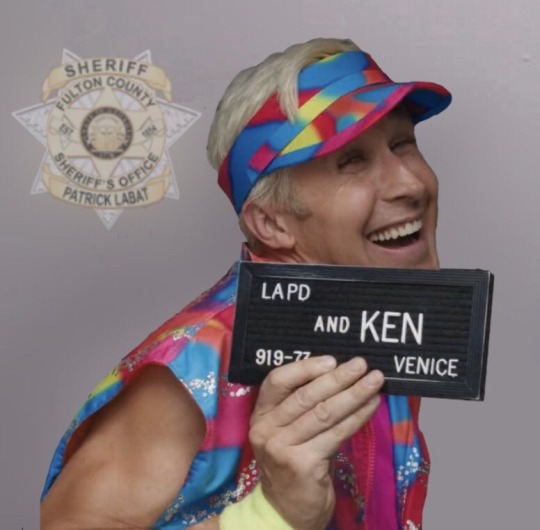
#Donald Trump#Trump#Trump Mugshot#Ken#Barbie#The Barbie Movie#Barbie The Movie#Barbie 2023#Ryan Gosling#Ryan Gosling Ken#Shitpost#Politics#US Politics#American Politics#Trump Indictment#Barbie is probably doing her own thing with Gloria <3#Ken likely accidentally got caught up in all of this because he thought horses were involved#He makes that face everytime he gets arrested
12K notes
·
View notes
Text
Out of all the amazing choices in Barbie, I think the most iconic is the choice to make Ken a horse girl
7K notes
·
View notes
Text
cannot believe there are people who aren't familiar with the 2002 movie Spirit: Stallion of the Cimarron. it's not remembered as one of the animated classics of the early 00s because it's so different than other beloved movies - no talking animals, no fantasy settings, limited comedic elements - but my god did it shine in so many other ways. arguably some of the best 2D animation ever created, outstanding soundtrack, an hour and a half of pure anti-imperialism and anti-colonialism in a kid friendly story about horseys.
#spirit stallion of the cimarron#you look at those horses running with every joint animated spot on and tell me this isn't the pinnacle of animation#you listen to sound the bugle now and tell me this isn't THE movie soundtrack of the decade
20K notes
·
View notes
Text
WOAH these Barbie Movie fan arts are so cute!!! 💖💖 credits to the original artist ✨

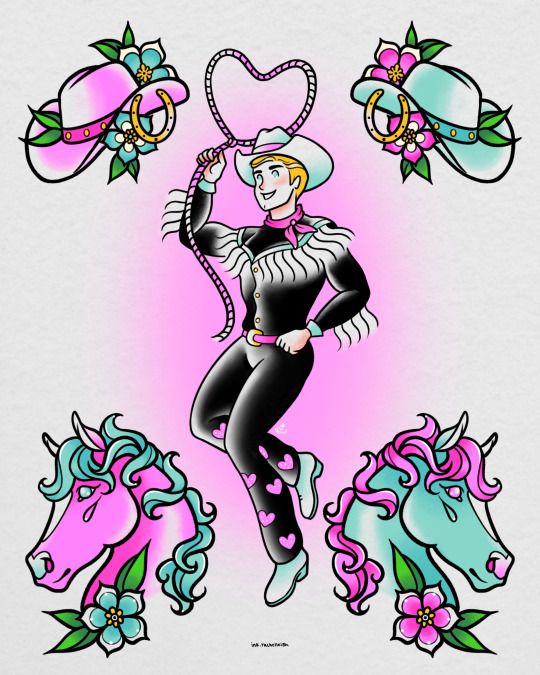
#fanart#fan art#female artists#aspiring tattoo artist#austin tx#digital art#tattoo ideas#digital illustration#tattoos#cute tattoos#tattoo design#tattoo artwork#barbie#barbie movie#I’m just Ken#Ken#tattoo flash#barbie fanart#barbie fandom#Barbie cowgirl#cowgirl#pink#cute art#cute#so cute#horses#flower
3K notes
·
View notes
Text
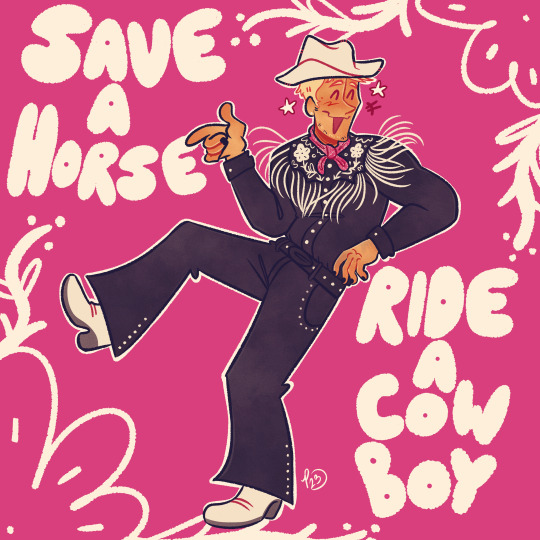
SO I SADDLE UP MY HORSE AND I RIDE INTO THE CITAAYY !!!!!
#I MAKE A LOTTA NOISE CAUSE THE GIRLS THEY ARE SO PRETTAAYYY#ken would loop this song and be like “yes !! the horses need to be saved !!!!! :)”#and not think anything else of this song bc he has no idea why you would ride a cowboy..but saving the horses is definitely important#do not tell him the actual meaning of this song let him have his fun he loves horses !!!!#barbie#barbie movie#barbie fanart#ken#barbie and ken#ken barbie#barbie 2023#barbie ken#barbie art#fanart#greta gerwig#ryan gosling#margot robbie
4K notes
·
View notes
Text
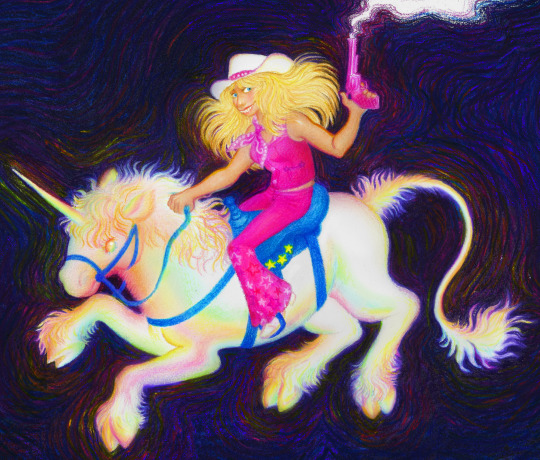
do you guys ever think about dying
#art#fan art#barbie#barbie the movie#barbie 2023#illustration#colored pencil#wouldve been more in-character to put ken on the unicorn but i wanted to draw Her lol#also still thinking abt ken describing horses as “man extenders” or something like that#hes so right they are
4K notes
·
View notes
Text
love how the barbie movie fans are split into three categories:
- the extremely long paragraphs of revelation of how hard it is to be a woman
- the kenough/kenergy/horses memes
- allan
#its so funny to me to see such different content every time i search up barbie#barbie#barbie 2023#barbie the movie#greta gerwig#margot robbie#ken#allan#ryan gosling#michael cera#kenergy#kenough#horses#there is only one allan
6K notes
·
View notes
Text
my one (1) complaint about the barbie movie is that they showed the only horses in Barbieland being horse head on stick toys when really there should have been a representation of the direct doll to horse girl pipeline of barbie pegasus.

i’m not saying a cgi horse. i’m saying a giant plastic barbie pegasus.
#and ken becomes obsessed with horses when he sees a real horse#which is how most horse girls are born#from loving barbie horse to seeing a real horse#barbie movie#barbie#spoilers#ken#ryan gosling#movies#i'm picturing a milky white from into the woods type thing
4K notes
·
View notes
Text
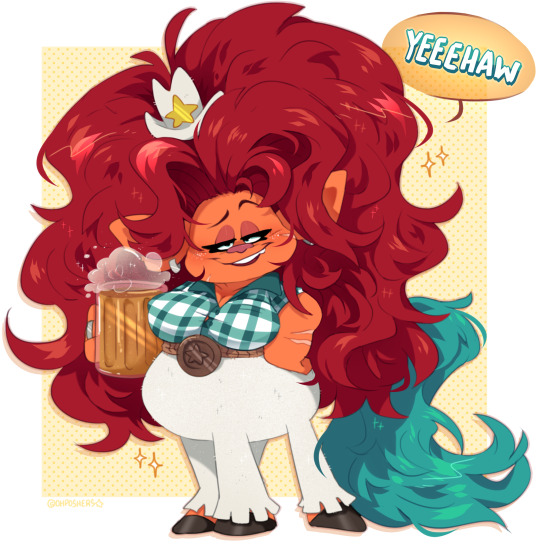
how has it taken me this long to draw the best Troll in the series
#i unironically am down bad for delta dawn#country trolls horse halves are the same color as their top halves btw theres a lot of proof of this in the movie i will die on this hill#what if i went insane and shipped her with viva#trust guys trust#trolls#trolls world tour#delta trolls#delta dawn trolls#my art#blushing at her actually
1K notes
·
View notes
Text
Making you guys pick the movies I see most talked about on here. I just want to know what everyone else likes the most. I only just realized they're all animated 🤷♀️
#shrek 2#Shrek#megamind#lorax#the lorax#spirit horse#spirit stallion of the cimarron#studio ghibli#spirited away#howls moving castle#prince of egypt#emperors new groove#barbie princess and the pauper#barbie#poll#polls#movie poll#fun poll
4K notes
·
View notes
Photo

The Food of the Gods
I haven't watched a Bert I. Gordon movie in a while. This one is, like Village of the Giants, very loosely based on his favourite H. G. Wells book, and it stars Marjoe Gortner from Starcrash. Fun factoid: according to Wikipedia, Gortner's name is a portmanteau of 'Mary' and 'Joseph', which I guess seems like a good idea to people in the Bible Belt. I don't think this movie has a Rifftrack, but I'm afraid I gave up years ago on trying to keep track of those... as some of you have already noticed.
A football player named Morgan and a couple of his buddies head out for a weekend on Vancouver Island, and things quickly start to get weird. First, one of the guys is attacked and drained dry by mosquitoes the size of eagles, but I've been to Vancouver Island so that doesn't surprise me at all. What's more shocking is when Morgan goes looking for help and finds himself in a battle to the death with a chicken that would fit right in at Jurassic Park! It seems that some kind of disgusting white goo has been bubbling out of the ground and anything that eats it grows enormous. The local farmers think they're going to get rich feeding it to their livestock, but they've failed to take proper precautions to keep the flies out. And the wasps. And worst of all, the rats!
My first observation about this movie is that Gortner looks significantly less drugged than he did in Starcrash. I'm not sure what to do with this fact, but there it is.
The special effects in Food of the Gods are pretty standard Bert I. Gordon, with some see-through giant bugs, some roaring noises dubbed over footage of rats doing rat things, and some puppets. The superimposed insects are particularly bad even by Bert I. Gordon standards, and would have sucked in the 50's, never mind the 70's. The split-screen stuff and miniatures work is okay at best and at worst we have a cardboard house with windows painted on. The puppets, however, are actually not bad. The rat heads, and their piled-up corpses at the end, are surprisingly realistic for a movie like this, and the giant maggots in one scene are lifelike enough to turn the stomach quite effectively. Unfortunately, it looks like lots of rats were harmed or killed in the making of this movie, and if you are sensitive about animal welfare, or if you have pet rats, you probably don’t want to watch it.
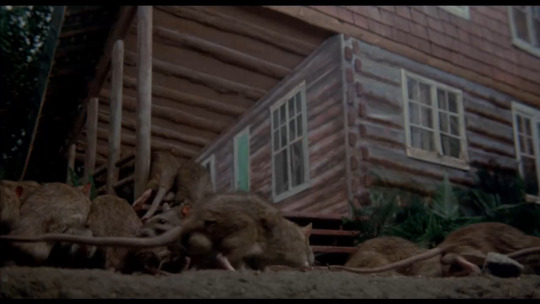
The effects may be par but on other levels this is a rather atypical film for Bert I. Gordon, particularly in its point-of-view character. I have noticed before that a lot of BIG's scale-themed movies tell the story through the eyes of a woman whose role is to passively watch events that are far beyond her control. She may set the plot in motion and is often the love interest of an active male protagonist, but she ultimately does very little. Think of Susan in The Cyclops, Audrey in The Beginning of the End, or Lori in Necromancy.
Food of the Gods does not do this. It wants to use Morgan as both its hero and its audience identification character, which honestly is much more like how most people would try to tell a story. The thing that's kind of interesting, at least to somebody who's far too familiar with Gordon's filmography, is how this compares to his female-led films. In several ways, it really works less well.
To begin with, Morgan is somewhat deficient in the personality department, and what glimpses we do get of who he is and what he thinks about don’t seem relevant to what he does over the rest of the film. At the beginning of his trip to the island, Morgan and a couple of friends corner a deer. His buddies want to kill it, but Morgan protests that they've already 'won' and they have no reason to do that. Within the story this functions to split up the group – one guy goes to follow the deer anyway, and is attacked and killed by huge insects. But it also seems to establish Morgan as somebody who considers himself sympathetic to nature while unaware of his hypocrisy towards it (it's cruel to kill the deer, but okay to terrify and exhaust it?) and we expect that we will see him confront this over the course of the story. We do not. When animals become a threat to him, he has no problem killing them, and he never seems to stop and think about it.
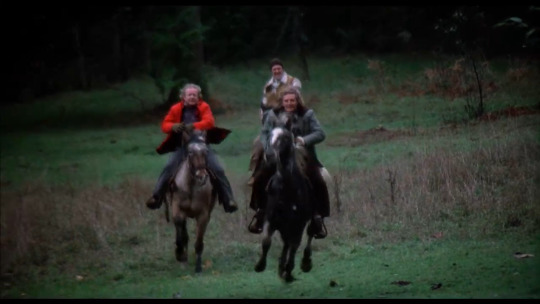
Another attempt to give him some character is when Lorna, the bacteriologist working for the food company the islanders are hoping to sell their livestock to, tells him “you don't like women around while you do your thing, do you?” Morgan protests that this is not true: he doesn't like people in his way, regardless of their gender. This is ham-fisted, a telling rather than a showing, but it's trying to set him up as a lone wolf type, somebody who believes that if you want something done right you have to do it yourself. Yet it never comes up again. He is never forced to ask for help when he had insisted he didn't need it. And Lorna's apparent disgust with his individualism also evaporates, as she later tells him in the middle of a tense moment that his rugged manliness makes her want to fuck him right there. She's a little more polite than that, but Jesus.

Worse, we have very little idea of
why
Morgan feels like this is his responsibility. He escaped the island after the death of his friend, but goes back to deal with the animals. Why is that his job? I guess it might be a desire for revenge, or maybe a feeling that nobody else will do anything... if the latter, it might have been nice to see him try to report this to some authorities and not be believed. Then again, we saw in
Beginning of the End
that 'nobody believes in the monster' is a trope Gordon prefers to avoid.

We can now contrast Morgan with the leads in Gordon's other movies. Morgan has a great deal to do in this movie, but we don’t get much sense of what he’s trying to accomplish or why. Does he want to destroy the goo and its monsters, or just escape alive with the others? The women in BIG's older movies, on the other hand, while they often do very little, are always determined, goal-oriented individuals. Carole from The Amazing Colossal Man was annoying and weepy, but she was smart enough to know she was being lied to, and she was determined to find Glenn and help him in whatever way she could. Likewise Joyce in War of the Colossal Beast, who finds herself stymied at every turn but isn't afraid to complain about it, even to men who think they have every right to tell her to get lost. Carol in Earth vs the Spider wanted to hang on to the last gift her beloved father ever gave her. Audrey Aimes in Beginning of the End was doing her job as a reporter, following a story and bringing it to the world. We always knew not only what they were doing, but why.
I'm not sure why the difference between them and Morgan. Bert I. Gordon was clearly capable of writing people with reasons for the things they do, even when the audience knows those reasons are less than rational. There are even examples in Food of the Gods. We have Mrs. Skinner, who has a creeping feeling that this has all gone terribly wrong, but trusts her husband's judgment and takes refuge in her faith; and Lorna, who is clinging to her self-respect in the face of an asshole boss. All these more successful characters seem to have only one other thing in common and that's that they are all women. I feel like it would take somebody with more background in psychology than I to really get into the meat of this. Freud would probably have loved it.
There's one other place where Food of the Gods seems like it's going to go somewhere, and that's with the nature of the mysterious white goo itself. An opening voiceover by Morgan suggests that it's produced by the Earth as a form of revenge on humanity, and the two farmers, Mr and Mrs Skinner, believe it's a gift from God to make their farm prosperous. Later in the movie, however, we see a white rat with red eyes among the throngs – an albino. The first association anyone has with white rats is, of course, laboratory animals... was this stuff created by an Evil Corporation?
Apparently not, since there's no further exploration of this. We don't find out where the white rat came from, it's just there, evidently a random mutation. What gets really weird is when a character later points to it and says, “looks like the white one's the leader!” What? Since when do rats have leaders? I think we're meant to assume that the rats are a little more intelligent and organized than their smaller brethren, since they're able to shut down an electrified fence by knocking a tree onto a generator (although we don't see this, so it could have been an accident), but the white one in no way seems to be directing them. At the end there's a brief 'climactic battle' between Morgan and this animal, as he clubs it to death with the butt of a rifle, but it’s not nearly formidable enough to justify the special attention paid to it.
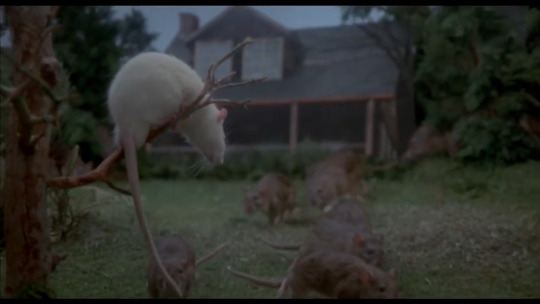
I really am going to write a book on Bert I. Gordon's movies someday. My father has asked me why, if I want to over-analyze movies, I don't do good movies, or at least average ones. My reply is that there are plenty of people who devote their lives to the work of Kubrick or Kurosawa. There’s even a guy on YouTube who has spent hundreds of hours examining the lore of the aforementioned Jurassic Park franchise. But nobody sits and thinks about the films of Bert I. Gordon... except me.
#mst3k#reviews#episodes that never were#the food of the gods#70s#tw: animal cruelty#mister big#there are horses in this movie
18 notes
·
View notes
Text
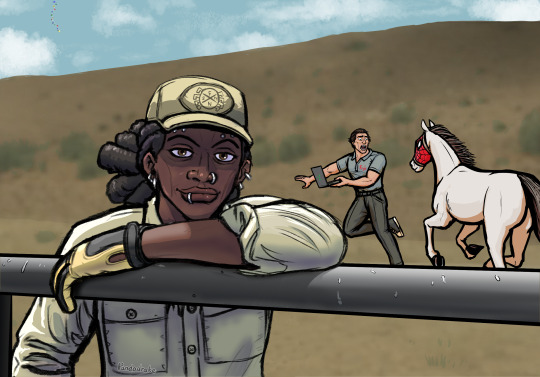
Horses.
I really like that other movie that Hobie's voice actor was in.
IDK why I ended up putting so much effort into the rendering this was just supposed to be a shitpost.
Hobie's pose is heavily referenced from a shot from the movie Nope (2022). The background texture is also from the same frame.
Miguel is cast as the stressed-out, half-Latino, tech guy with an angel name who watches camera feeds all day and bitches about his life to people he just met.
#*stares at you*#ATSV Hobie having the same eye shapes as Daniel Kaluuya is pretty much the only reason this exists#i couldn't bring myself to get rid of the wicks (it felt like sacrilege) so hat hammerspace is working overtime#this looks like Hobie’s the host of a reality tv show where every choice results in getting trampled by horses.#see you spider cowboy#my art#oj haywood#angel torres#nope 2022#nope movie#across the spiderverse#hobie brown#spider punk#hobart brown#hobie spiderverse#daniel kaluuya#miguel o'hara#atsv miguel#atsv#atsv fanart#atsv hobie#spiderman atsv#into the spider verse#spiderverse#across the spider verse#man vs horses#crossover#spider horse#horse#spiderman 2099
2K notes
·
View notes
Text
I was in a cowboy movie but underwater. Horses were sharks and people were octopi. I was the only human.
591 notes
·
View notes
Text
I'd like to congratulate Jordan Peele on making an anti-horse girl movie. No, that wild animal will not be magically tamed by your presence and conviction, that is a creature.
#nope#nope movie#nope spoilers#had this thought after waking up this morning and im obsessed#jupe really was ready for his horse girl moment rip
19K notes
·
View notes
Text

I am Kenough but it’s Link (he’s also a horse girly)
#I had a spur of the moment idea so I just HAD to sketch it#link#legend of zelda#botw#totk#breath of the wild#tears of the kingdom#barbie movie#Ken I guess??#I am kenough is so funny I’m so sorry#the only parallel here is that he likes horses THATS IT
2K notes
·
View notes